Nomikai is an important part of Japanese work culture. Japanese companies usually hold drinking parties to celebrate project achievements and the New Year’s, to welcome new employees, and other special occasions.
In this article, we will introduce Japan’s nomikai culture and the etiquette to follow. We will also explain what “nominication” is, which is used in business situations.
※ The legal age to drink alcohol in Japan is 20. Drinking and driving is illegal in Japan.
First Published: 2020-09-11
Updated: 2024-07-05
Table of Content
- What is Nomikai (飲み会)? What is Nominication (飲みニケーション)?
- Nomikai Manners and Etiquette
- Features of Nomikai Sessions in Japan
- Recent Changes in Nomikai Culture
- Find a Job in Japan with WeXpats
 Are you having any issues with job-hunting in Japan?
Are you having any issues with job-hunting in Japan?
What is Nomikai?

Nomikai (飲み会) are drinking parties in Japan that make up an important part of Japanese work culture. Nomikai are often held after work for the purpose of socialising and bonding among colleagues, superiors, and juniors. Japanese companies also often hold nomikai for New Year’s, welcome parties, project achievement celebrations, and other special occasions.
What is Nominication?
Nominication (飲みニケーション) is a word that combines “Nomikai (飲み会)” and “Communication (コミュニケーション)”. It refers to communication over drinks that is done during nomikai. Through nominication, it is believed that coworkers can have honest discussions and foster better relationships for the next job.
Why are Nomikai held? Why is it necessary?
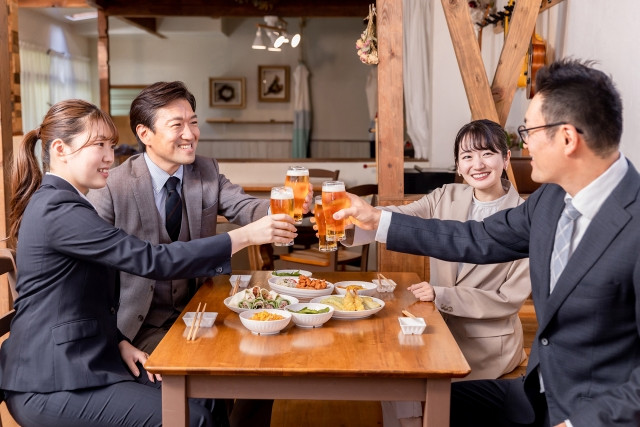
Nomikai with coworkers are often held to facilitate “nominication”. In Japan, alcohol is considered an important communication tool. Drinking alcohol helps to ease tension and make it easier to talk about difficult topics, so nomikai is often thought of as an important opportunity to facilitate communication.
In addition, nomikai also helps create opportunities for people you rarely meet or work with despite being in the same company or department to deepen their bonds. Nomikai are opportune chances to meet, build relationships with, and to remember the names and faces of people around you.
“Nomikai for work are not necessary”, A New Train of Thought
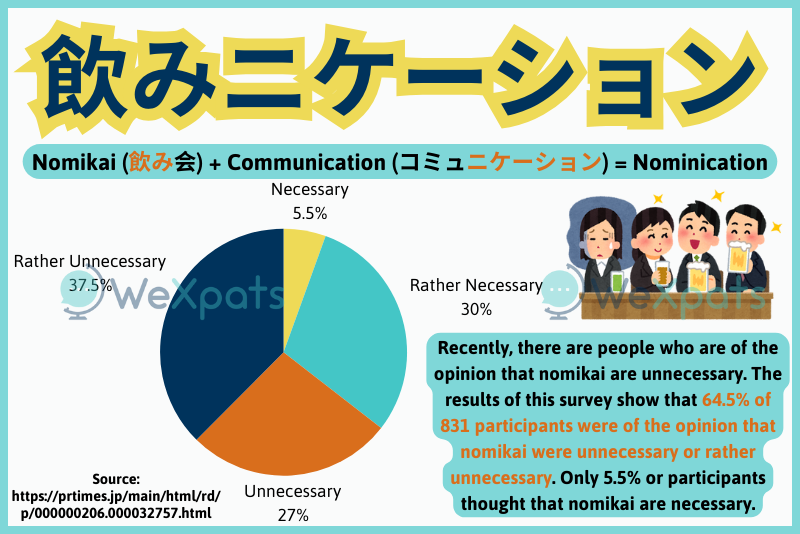
Nowadays, there are people who are of the opinion that nomikai are no longer necessary, and there are companies that hold alternative events to facilitate employee interactions.
In a recent survey about Nominication conducted by Next Level Col., Ltd., working adults were asked how they felt about Nominication and Nomikai. The survey found that among the 831 survey participants, 64.5% thought that “Nominication is unnecessary ” (27%) and “Nominication is rather unnecessary” (37.5%). And, among the 35.5% that chose “Nominication is necessary” and “Nominication is rather necessary”, only 5.5% thought that “Nominication is necessary”.
When asked about their opinions, those in favour of Nominication gave reasons such as “deepens relationships with colleagues, superiors, juniors”, “it’s fun”, “it becomes easier to work”. Comments include, “drinking alcohol creates a relaxed atmosphere which allows you to communicate with people you normally wouldn’t”, “I realise that my boss and senior colleagues who were strict and intimidating at work were friendly and cheerful when they got drunk, and it became easier to talk to them at work”.
As for those against Nominications, the reasons they gave included “have to be considerate”, “it is outside of work hours”, “it costs money”, “it is not fun”, and “I am bad with large crowds of people”. Comments include, “It would be more meaningful to go home early and get some sleep”, “Need to be considerate of others and pouring drinks is essential, I just can’t relax”, “It’s like working overtime.”.
※ PR Times, “2024年最新調査:「飲みニケーション」はありかなしか、 社会人831人に聞いてみました”
Writer's Pick
Nomikai Manners and Etiquette
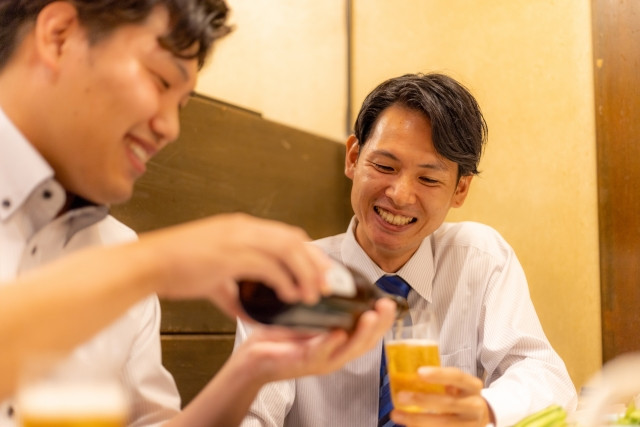
Nominication is an important part of Japanese work culture for fostering workplace relationships. Not sure what is the proper etiquette and manners for nomikai?
1. Be Punctual for Nomikai
Punctuality is important in Japan and equally so for nomikai sessions. Arrive at the meeting place 5-10 minutes before the meeting time. If by any chance you are not able to make it on time, contact the planner as soon as you can.
2. When Sitting, Follow the Seating Order
In Japanese nomikai, the seating order is often based on rank. This is called “席次 (Sekiji)” with people in higher positions sitting in the back, while new employees and regular employee sitting at the front and near the entrance, which is considered good manners. Apart from nomikai, Sekij is also practised in regular business settings, such as when riding the elevator, and seating arrangements for meetings. It is good to remember how Sekiji works outside of nomikai.
3. Rules for “Kanpai!”
“Kanpai (乾杯)” is the Japanese equivalent of “cheers!” when giving a toast. There are certain rules when doing “Kanpai” such as you should not raise your glass before superiors or seniors, and when toasting, your glass should be in a lower position than people of higher positions.
Generally the first drink for nomikai is beer, this is to make ordering easier when there are many people. However, recently, it has become common to do the first toast with your favourite alcohol or non-alcoholic drink. If you want to know whether toasting with something other than beer is allowed, inquire with the nomikai organiser.
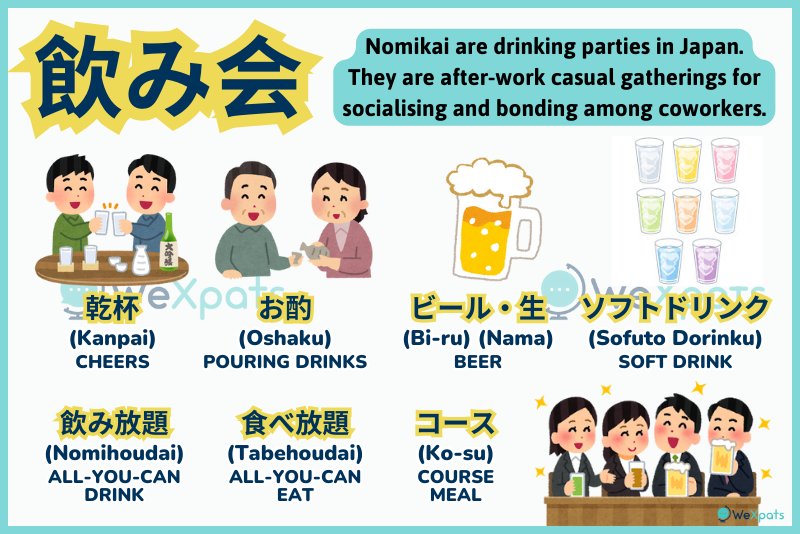
4. Think of It as Part of Your Job and Don’t Go Overboard
Nomikai and nominication is at the end of the day part of work. Be careful not to go overboard with drinking and be respectful when going for nomikai with coworkers. Drink at your own pace, if you overdrink till you can’t even walk straight, it will be an inconvenience to those around you. Though there are people that do go overboard, it is important to know your limits and stop before then. Enjoy drinking in moderation and make an effort to build good relationships with your colleagues, superiors, and business partners.
5. Pay Attention to Those Around You and Be Considerate
At Nomikai, if the other person’s glass is empty, it is polite to ask, “Would you like something to drink? (何か飲まれますか?)” When ordering a bottle of alcohol, it is also polite to practise "Oshaku (お酌)", aka “pouring for others”. At work nomikai, usually juniors and regular employees pour drinks for their superiors and seniors. However, some people want to enjoy drinking at their own pace, so do not insist when the other person says it is okay, forcing drinks on someone is considered as harassment. Nomikai manners and etiquette vary from company to company, so observe the environment and act accordingly.
6. Expressing Gratitude After the Nomikai
It is considered good nominication manners to give thanks to coworkers or business partners at the end of a nomikai. Especially if your boss or senior pays for the bill, you should thank them on the spot.
Features of Nomikai Sessions in Japan
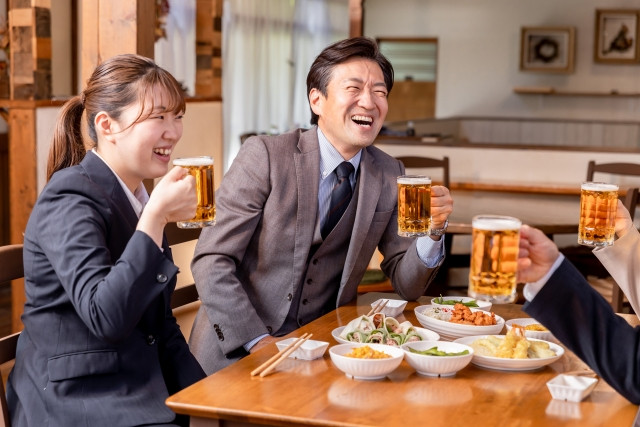
Nomikai culture in Japan is quite different from drinking parties overseas. Here are some things to be careful of when joining a nomikai in Japan.
1. Focus on Business or Work-related Topics
In Japan, it is common to have nomikai to talk business and work with coworkers. Whether it’s a weekday or holiday, nomikai with coworkers are held. During the day people work hard at work, and after work they enjoy drinks and conversation with coworkers.
Drinking parties with coworkers are also held overseas. The difference is that unlike Japan where conversation is usually focused on business or work topics, it is considered good manners to forget about work and talk happily once drinks arrive.
2. People Who Get Drunk from Overdrinking
Have you ever seen drunk people on streets with many izakayas or in front of train stations? In Japan, it is not uncommon to see people who have drunk so much after a nomikai that they fall asleep on the train or are so drunk that they can't walk properly.
3. Hard to Fit In at Work if You Don’t Attend Nomikai
As mentioned many times before, nomikai is deeply rooted in Japanese society and work culture, and it is not uncommon to not fit in at work if you do not participate. In Japan, drinking parties with coworkers are considered a vital part of workplace communication. It is believed that showing a different side of yourself helps build trust between each other which makes work progress more smoothly.
4. Culture of Pouring Drinks for Superiors
In Japan, nomikai culture consists of pouring drinks for superiors such as bosses and seniors. This custom is called “Oshaku (お酌)”, and the verb is called “Oshaku wo suru (お酌をする)”. Pouring drinks is an opportunity to communicate with superiors that you normally don’t have a chance to meet.
5. It Is Not Bad Manners to Order Food That Can’t Be Shared
When ordering food for a nomikai, it is not against manners to order individual dishes for your own consumption, such as udon or ochazuke. Certainly, it is common to order dishes that can be shared out among the group, but there is nothing wrong with ordering individual dishes for yourself as well.
6. Participants May Split the Cost
At times the company or superios may pay for the nomikai, but it is also not uncommon for all nomikai participants to split the cost. Expect to pay around 3,000 to 5,000 yen for a company’s nomikai. If a superior helps pay for the nomikai or subsidises the amount, remember to express your gratitude as soon as possible.
Recent Changes in Nomikai Culture
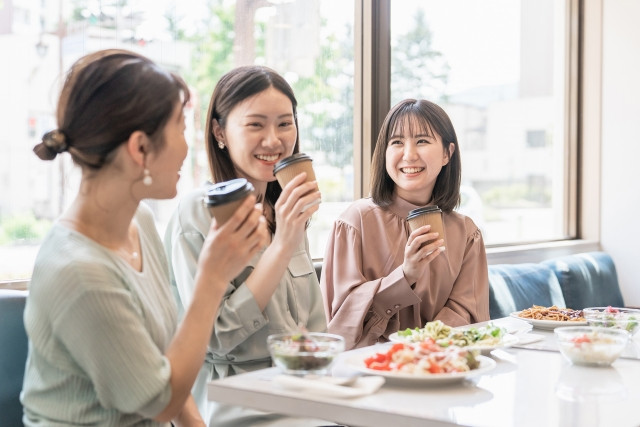
Nowadays, Japanese companies are holding events in-place of nomikai to cater to employees who value their private time or do not drink alcohol. Office activities such as lunch meetings and get-togethers are held during working hours, there are also “club activities” where people with common hobbies can get together.
In Japan, more and more people are starting to think that “nomikai are unnecessary”. In the future, social events that people who can’t drink or can only attend during working hours will likely become more common in Japan.
Find a Job in Japan with WeXpats
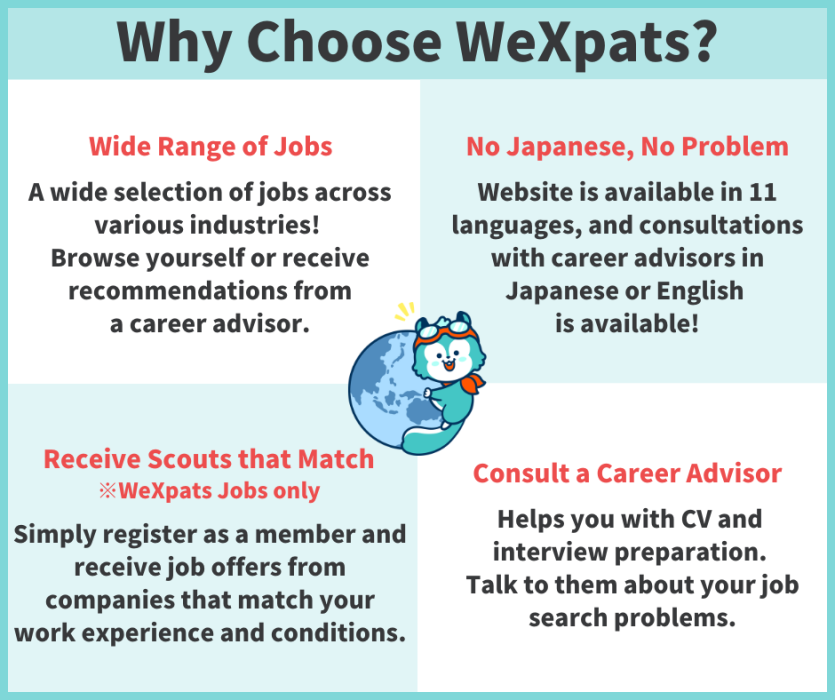
WeXpats operates a service for foreign nationals who want to work in Japan. There are jobs in a variety of industries. There are 2 services available on WeXpats - WeXpats Agent for full time jobs and WeXpats Jobs for part time jobs.
Looking for a Full Time Position? Leave it to WeXpats Agent!
WeXpats Agent is a career support service that specialises in employment for foreign nationals living in Japan.
Recruitment agencies in Japan are a service where dedicated career advisors will assist you with your job hunt for free. In addition to introducing open positions, we also provide support to help you create your Japanese resume and practice for interviews. Worried about job hunting in Japanese? We are here for you.
Features of WeXpats Agent
-
We have many job openings that are a good fit for foreign nationals to work in, such as translation, interpretation, inbound, etc. jobs that make use of your language skills, as well as engineering etc. jobs that do not require Japanese skills.
-
Our career advisors support and help you prepare your resume and practice job interviews with you. Clearly communicate your strengths to the hiring company.
-
We will handle communication with companies on your behalf, such as arranging interview dates and negotiating conditions. And thereby reducing your stress and time spent.
Finding a Part Time Job? Browse on WeXpats Jobs!
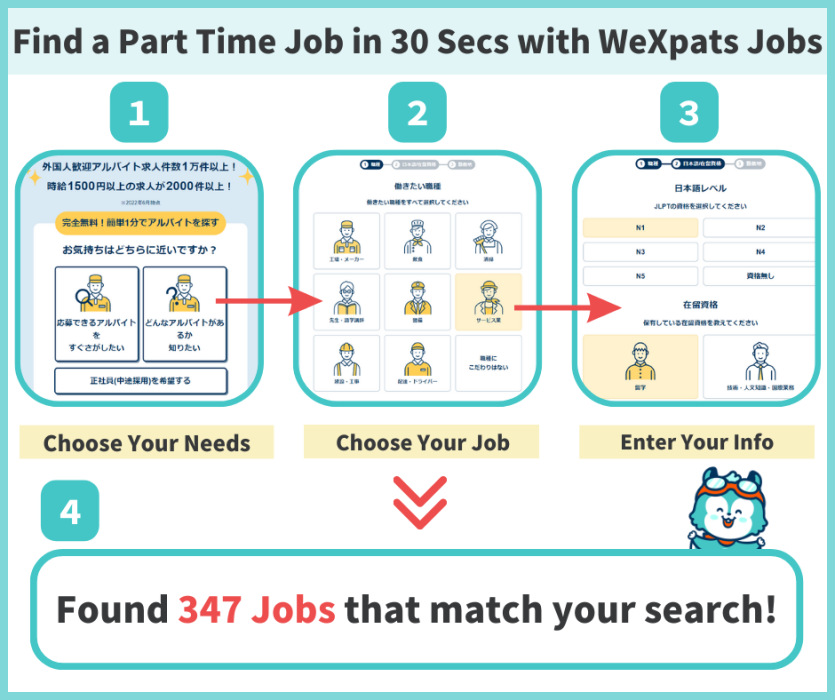
WeXpats Jobs is a part time job site for foreign nationals living in Japan. You can search for jobs in 11 languages (English, Vietnamese, Korean, Indonesian, Traditional Chinese, Simplified Chinese, Burmese, Thai, Spanish, Portuguese), including Japanese. Find jobs that suit you by specifying your Japanese language level, occupation, location, and etc.
※ You can register from outside Japan, but only those living in Japan can apply for jobs.



































